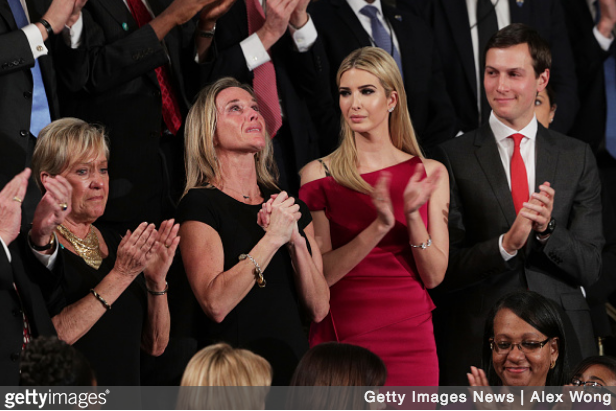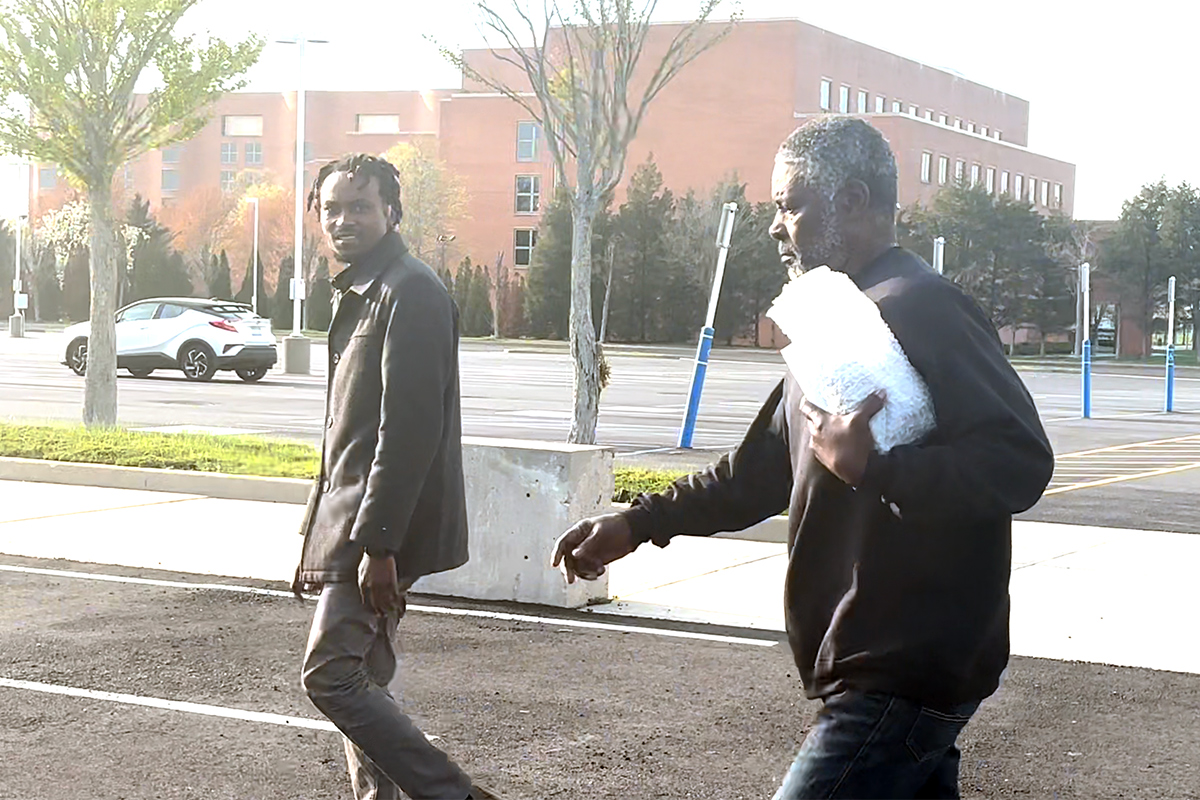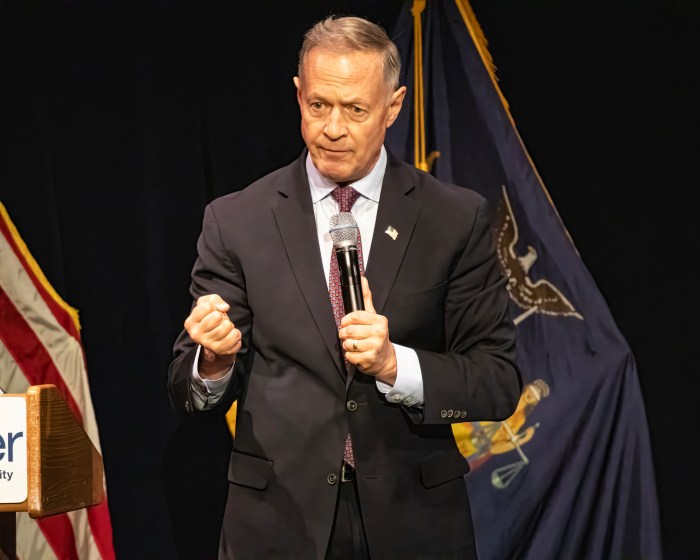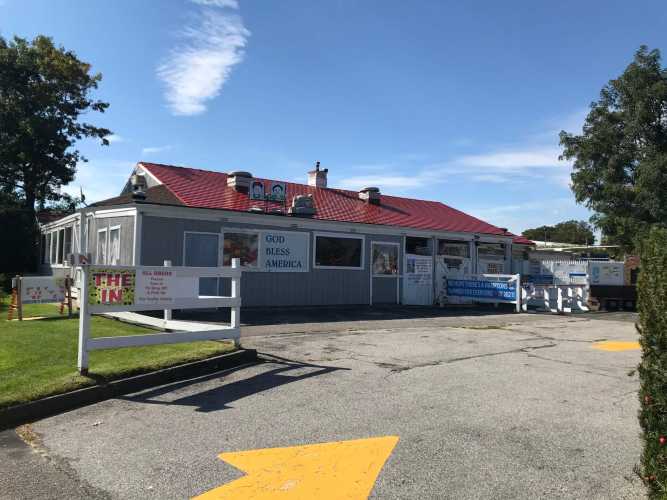The acknowledged highlight of President Trump’s Joint Address to Congress Tuesday night was the two-minute ovation given to the grieving widow of U.S. Navy SEAL Chief Petty Officer William “Ryan” Owens, who died in a controversial raid on an al-Qaeda compound in Yemen on Jan. 29.
Lingering questions regarding the ill-fated mission—the first one in that country since 2014—have prompted calls for a congressional investigation into how the operation was planned and approved so early in the Trump administration’s tenure, rather than relying solely on a Pentagon inquiry, which is customary yet could take months and never be made public. Long Island’s congressional delegation is split over the issue. Meanwhile, the United States launched new airstrikes in Yemen Wednesday night.
Besides the death of Chief Owens in January, the Pentagon said three members of Navy SEALs Team 6 were wounded. In turn, they killed 14 militants but also 20 civilians, including an 8-year-old daughter of a radical US-born cleric who’d been killed previously by a U.S. drone strike. A $70 million MV-22 Osprey damaged during the assault was also destroyed during the mission to keep it from falling into al-Qaeda’s hands. Whether the mission got vital intelligence about the terrorist organization is still being debated, along with whether Trump should have even approved the raid at all, considering he’d barely been in the Oval Office a week.
Long Island’s senior member of the delegation, Rep. Peter King (R-Seaford), serves on the House Homeland Security Committee, Permanent Select Committee on Intelligence, is chairman of the Sub-Committee on [Counterterrorism and Intelligence], and gets briefed on these kinds of operations.
“I can’t go into details other than to say that this was many months in the planning,” King told the Press. “It was approved by every military official. It was encouraged by every military official, and certainly [Defense] Secretary Mattis endorsed it, and supported it.”
King says that after every operation, whether it’s successful or not, the Pentagon conducts an “after-action report.”
“Basically, what went wrong on this [Yemen mission] could have gone wrong at almost any time,” said King. “Without going into detail, there were no mistakes made. There’s always risks.”
According to Coleman Lamb, a spokesman for Rep. Kathleen Rice (D-Garden City), who serves on the House Committee on Homeland Security and the House Committee on Veterans’ Affairs, she supports further congressional action.
“Rep. Rice agrees that Congress has a role to play in answering serious questions about how this mission was planned and executed and what led to the death of Chief Owens and dozens of civilians,” Lamb told the Press. “She believes strongly that there should be nothing remotely political or partisan about this. Members of Congress from both parties should come together and get the facts.”
Her other Republican colleague from Long Island, Rep. Lee Zeldin (R-Shirley), is content to leave Congress out of it, and let the Pentagon go through its normal protocols, according to his communications director, Jennifer DiSiena.
“The next step is for the military to complete a 15-6 investigation,” DiSiena told the Press in an email. “A 15-6 would take place within the Army and is intended to be a timely, thorough and legally sufficient investigation.”
Zeldin, a Major in the Army Reserves, serves on the House Foreign Affairs Committee and is a member of the Congressional Military Family Caucus.
Freshman Democratic Congressman Tom Suozzi (D-Glen Cove), a minority member of the House Committee on Armed Services, as well as the Tactical Air and Land Forces Subcommittee and Subcommittee on Middle East and North Africa, was unavailable for comment, despite repeated requests to weigh in.
Chief Owens’ father Bill, a Navy veteran, was so angry about the raid that cost his 36-year-old son’s life that he refused to meet with President Trump at Dover Air Force Base in Delaware when his son’s body was returned to American soil on Feb. 1. According to the Miami Herald, the father criticized the special operation and the aftermath.
“The government owes my son an investigation,” Owens said. “Don’t hide behind my son’s death to prevent an investigation.”
The morning of Trump’s address to Congress, the New York Times editorialized that “Mr. Owens deserves to know whether his son died in a worthwhile pursuit or a botched mission of dubious value.”
In Congress on Tuesday night for the president’s speech, Carryn Owens, Ryan Owens’ widow, sat with tears streaming down her face in the front row of the balcony next to Ivanka Trump. The president singled her out, saying:
“Ryan died as he lived: a warrior, and a hero—battling against terrorism and securing our nation.”
As for the point of the mission, Trump cited his Defense Secretary James Mattis.
“I just spoke to our great Gen. Mattis, just now, who reconfirmed that, and I quote, ‘Ryan was a part of a highly successful raid that generated large amounts of vital intelligence that will lead to many more victories in the future against our enemies.”
As Sen. John McCain (R-Arizona) told NBC News in early February, however:
“When you lose a $75 million airplane, and more importantly, an American life is lost…I don’t believe you can call it a success.”
In a talk with news anchors Tuesday before his speech, Trump blamed the generals “who are very respected, my generals are the most respected that we’ve had in many decades, I believe. And they lost Ryan.”
“I wouldn’t have said it that way,” King told the Press. “The fact is, ultimately the president is responsible.”
Asked to respond to what Bill Owens had said about his son’s death, King demurred.
“Listen, I can’t begin to understand the father’s grief, so I would respect whatever he says and understand his right to say it. I would never question him,” King replied. “But his main objection to it—which was ‘Why are we in Yemen?’—it was President Obama who decided last fall that we should carry out operations in Yemen.”
Recently, White House press secretary Sean Spicer claimed the mission was discussed in the White House under former president Barack Obama, though members of the former administration allege that is not quite true.
According to the Washington Post, Colin Kahl, a former Obama administration official with knowledge of what the Pentagon presented to the National Security Council on Dec. 19, said that the request had no specifics about the raid; instead it was a broader request from the military to carry out raids in the country. Kahl said the outgoing Obama administration decided to let Trump review the request once he occupied the White House after inauguration.
How many details were available then remains unclear, hence the doubts lingering over Owens’ death.
In its Tuesday editorial, the New York Times urged Congress to demand answers to serious questions that it claimed may not be answered in a timely enough fashion by a Pentagon inquiry, stating:
“The most important is whether national security officials in the Trump administration carefully considered the risks and potential benefits of the operation, and explained them to Mr. Trump before the president approved it just five days after taking office.”
It noted that Obama administration officials “did not sign off on it before” the president left office. “Mr. Trump was reportedly briefed on the plans over dinner with members of the national security team, his son-in-law, Jared Kushner, and his domestic policy counselor, Stephen Bannon.”
Congressman King became livid about the assertion that President Obama had rejected the mission.
“That’s a typical New York Times lie. It’s a lie,” King told the Press. “President Obama did not disapprove it in any way. There were reasons why it was put off for several weeks which had nothing to do with any president’s decisions.”
King said he was privy to those details, but he wouldn’t comment on the record.
So far the raid is under investigation by the Department of Defense, according to Trump’s Press Secretary Sean Spicer. An officer in the Navy Reserve, Spicer told the White House press corps in his briefing the morning after Trump’s Joint Address that he’d been watching the State of the Unions for 30 years and he’d “never seen a sustained applause like that” for the widow Carryn Owens.
































